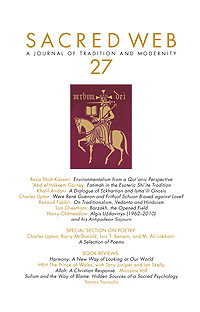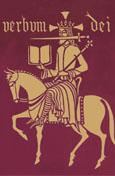Sacred Web 27
Editorial:
On Freedom and Necessity
by M. Ali Lakhani
In what sense are human beings free? At the heart of this question lies a metaphysical question about the necessity of spiritual determination within the Divine Nature and its reflection within the Primordial Nature of humanity: is freedom an aspect of necessity? The Editorial argues that true freedom only subsists within the confines of the Law—that is, of the Primordial Nature. Read more ...
A Qur'anic Response to ‘An Inconvenient Truth’
by Reza Shah-Kazemi
This is the revised text of a talk given at the Jupiter Trust at Oxford, in which the secular aims of environmentalism and its response to the environmental crisis, exemplified by Al Gore's call-to-action in An Inconvenient Truth, are contrasted with its sacred aims and the spiritual roots of the crisis, and are examined in particular from the perspective of Islam, the Qur'anic scripture, hadith and sunna.
Majma' an-Nurayn: Fatimah in the Esoteric Shi'ite Tradition
by 'Abd al-Hakeem Carney
This article explores the esoteric position of Fatimah, daughter of the Prophet of Islam, within the Twelver and Isma'ili Shi'ite traditions. The author remarks on how Fatimah has been studied in classical and modern feminist scholarship, where her role as a manifestation of the Divine has been largely ignored. The author then focuses on the relationship between Fatimah and the Shi'ite Imams. He discusses her title “The Radiant One,” and the relationship between Fatimah and the “Night of Power.” The essay closes with a discussion of Fatimah's role in the Isma'ili tradition, and draws conclusions concerning the relationship between apophatic theology and the feminine, as well as the relationship of this research to wider studies of women in Islam. The article contains numerous original translations by the author.
The Metaphysics of the Common Word:
A Dialogue of Eckhartian and Isma'ili Gnosis
Part Two: Intellectual and Emanative Reality
by Khalil Andani
This article, the conclusion of a two-part series (the first part was published in Volume 26 of this journal) presents a comparative dialogue between the Trinitarian metaphysics of Christianity as taught by Meister Eckhart and the metaphysics of Islam as elucidated in Shi'a Isma'ili theosophy, in which the three Persons of the Christian Trinity are compared with the three highest hypostases of Isma'ili gnosis. In this second instalment, the author continues the metaphysical dialogue by comparing Eckhart's concept of the Son and the Isma'ili notion of the Universal Intellect (al-'Aql al-Kull) in light of concept of the Divine Intellect. The author then explores the relationship between the Father and the Son as understood by Meister Eckhart and compares this to the relationship between the Divine Command and Universal Intellect as conceived in Isma'ili gnosis. This is followed by a comparison of Eckhart's concept of the Holy Spirit and the Isma'ili concept of the Universal Soul (al-Nafs al-Kull) in relation to the notion of Divine Love. The author also highlights the correspondence between the figures of Christ and his Virgin Mother in Christianity and the figures of the Imam and his Hujjah in Isma'ili Islam. The article concludes by exploring how metaphysical commonalities can inform and enlighten the Christian and Muslim dialogues in the modern world.
Were René Guénon and Frithjof Schuon Biased against Love?
by Charles Upton
Is there an opposition between knowledge and love in traditional metaphysics? And to what extent is it justified to read Guénon and Schuon as promoting the metaphysics of knowledge over the metaphysics of love? Upton places Guénon's teachings in their proper context in which bourgeois sentimentalism was in the ascendant, and he explores apparent contradictions within Schuon's writings on the subject, to show that both these traditional teachers emphasized the Intellect without derogating from the essential unity of compassionate knowing and loving being as fundamental to their understanding of Wisdom.
On Traditionalism, Vedanta and Hinduism
by Renaud Fabbri
Following on Albereto Martin's article (in Volume 26 of Sacred Web) regarding Frithjof Schuon and Advaita Vedanta, this article raises certain dissonances between Tradition and Hinduism with regard to three issues: reincarnation, initiation, and apocalyptic anti-modernism. Fabbri cautions against the perennialist tendency to create a false dichotomy between tradition and modernity.
Barzakh, the Opened Field
by Tom Cheetham
In this essay, which was delivered as a lecture at the University of Kent, Canterbury, England, in October, 2010, Cheetham discusses in a personal way his introduction to the seminal French philosopher, Iranophile, and Islamic scholar, Henry Corbin, and deals with several of his key ideas, focusing in particular on the notion of the barzakh, the isthmus or bridge between the outer and inner worlds, the imaginal realm where the “signs” of reality can be interpreted as on opened field of meaning. The essay concludes with an exploration of the relevance of Corbin's ideas to poetics and the transformative power of language.
Special Section on Poetry: A Selection of Poems
by Charles Upton, Barry McDonald, Iain T. Benson, and M. Ali Lakhani
In Memoriam: Algis Uždavinys (1962-2010) and his Antipodean Sojourn
by Harry Oldmeadow
Book Reviews
Harmony: A New Way of Looking at Our World
By HRH The Prince of Wales, with Tony Juniper and Ian Skelly
Reviewed by M. Ali Lakhani
Read more ...
Allah: A Christian Response
By Miroslav Volf
Reviewed by M. Ali Lakhani
Sufism and the Way of Blame: Hidden Sources of a Sacred Psychology
By Yannis Toussulis,
Foreword by Robert Abdul Hayy Darr
Reviewed by Samuel Bendeck Sotillos
Read more ...
Letters to the Editor
Confessions of a Lutheran Perennialist
by Larry Rinehart
Read more ...
A Question on Schuon
by Charles Upton
Read more ...
Notes on Contributors




